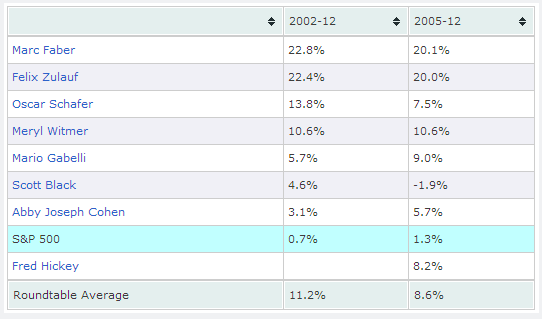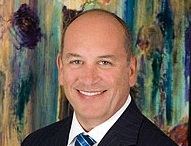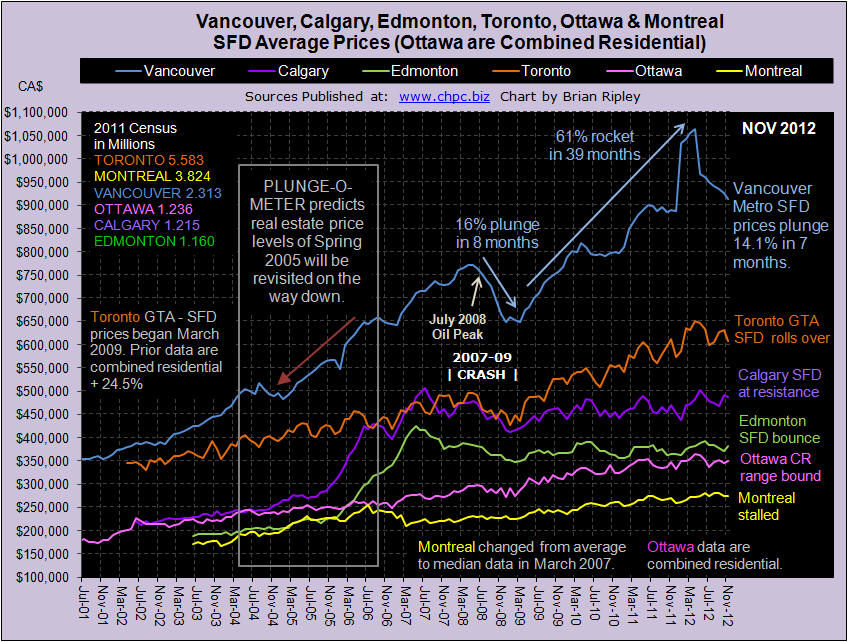Personal Finance
The guys over at Pundit Tracker have put together a pretty little update of the Barron’s Roundtable Pundits. Some of the pundits are very well know, but don’t have public track records. So their “guru” status leaves some wondering whether it’s truly earned. But here’s a nice tracker of their public calls over the last 10 years. The returns aren’t risk adjusted and most of the sample sets each year are too small to adequately judge, but I was intrigued to see Marc Faber and Felix Zulauf at the top of the list. These are smart guys (even if a bit hyperbolic at times) who generally have some pretty interesting ideas to offer. Here’s more via Pundit Tracker:
For a full breakdown of the 2012 picks, click HERE.
The pundits collectively are slightly underperforming the S&P again in 2012 (9.1% vs 10.0%). Mario Gabelli has been the top performer, thanks to several 65%+ gainers: Fortune Brands Home & Security, Cincinnati Bell, and Gaylord Entertainment. Marc Faber has continued his spectacular performance, with his emerging market bets paying off in spades. Meanwhile, Abby Joseph Cohen and first-time Roundtable member Brian Rogers have both turned in 15%+ gains so far. On the negative side, Felix Zulauf — who had been the best of the group through 2011 — has had his first sub-par year, as his bearish macro take has failed to play out yet in the markets. Finally, Fred Hickey’s recommendation of Marvell Technology has sunk him to the bottom of the rankings.
Here are the updated compounded annual return figures for the periods 2002-12 and 2005-12 (Hickey joined in 2005), with Faber now edging out Zulauf over both time periods:

Read more: http://pragcap.com/tracking-the-barrons-roundtable-pundits#ixzz2EtkZ8WNs

 With the rally unfolding as we discussed in our last commentary, we are now awaiting some form of a retest or consolidation to confirm that we’ve seen the actual low of the recent correction on November 16th at 12,471.
With the rally unfolding as we discussed in our last commentary, we are now awaiting some form of a retest or consolidation to confirm that we’ve seen the actual low of the recent correction on November 16th at 12,471.
The current market position is now overbought near important resistance levels. The key levels we are watching on the chart of the Dow Industrials is 13,069 which is just above today’s close with the next resistance level coming in at 13,209. If the market begins to struggle at these levels then we should see another short-term decline into the holiday season.

In Vancouver and Toronto a Dramatic Sentiment Shift is Manifesting. Calgary shares a bearish view with Toronto and Vancouver voters that prices will be down 20% next year, but their vote tallies suggest prices may be flat or only 5% down.
The Canadian Real Estate Plunge-O-Meter…
…tracks the dollar and percentage losses from the peak and projects when prices might find support.

The Toronto view is for a definite price break but the depth of plunge is still debatable. In Vancouver, the bears rule. RESULTS HERE
Vancouver average single family detached prices in November 2012 dropped again for a seven month plunge of 14.1% and a loss of $150,300 which is greater by 22% than the 2007-09 crash amount and the current plunge is an 85% retracement of the $177,329 gain since the beginning of the year (Vancouver Chart). At the “low end” strata prices slipped again and townhouses are 13.5% below their July 2011 peak and condos are down 9.9% below their April 2011 peak (Scorecard). Vancouver strata units are trading at 3Q & 4Q 2007 price levels and the Plunge-O-Meter predicts 2005 price levels will be seen again.
Earnings in BC held steady just 0.7% below their July 2012 peak, but remain 3.5% below Canada, 4.2% below Ontario and 19.8% below Alberta. BC earnings failed to follow Alberta’s big move up in early 2010 and has lagged average Canadian earnings since then by 3-5%.

…..for details on Calgary, Edmonton, Toronto, Ottawa, Montreal go HERE

The US is the place to be. That’s what everybody says. America has all the advantages: a stronger economy, a younger population, cheaper energy, and a central bank more ready to print money as necessary.
Look for US manufacturing to get a boost, especially in industries such as chemicals, from new energy discoveries. Households should benefit from lower energy prices too. And the dollar should go up as foreigners move their money to America in search of safety and higher returns.
Here’s Business Insider:
We are seeing calls that, thanks to shale drilling, the U.S. is poised to become the world leader in oil production, leading some to begin invoking “Saudi America.”
… Goldman Sachs analyst Kamakshya Trivedi, weighed in on the global macro implications of this phenomenon in a note titled: The shale revolution is changing the global energy landscape.
The note actually goes further, talking about how the entire economic landscape could potentially change.
The main impact, they write, is that oil prices will no longer prove a brake on growth:
…shifts in production are gradually loosening the oil price constraint that has been a persistent feature of the global economy. If global demand growth can recover, the risks that it will be choked off by rising oil prices are receding.
This will produce a knock-on effect for household incomes in the West, while blindsiding petro-states:
The drag on household incomes in the developed world from this source should end.
Meanwhile, central banks will be able to shift their focus from containing headline inflation:
Rising energy prices have affected core inflation measures to a degree, influencing the inflation outlook even for central banks, like the Federal Reserve, that have focused more on underlying inflation measures. As a result, lower ongoing energy inflation means that monetary policy may be easier on average than it otherwise would have been.
What? Fighting inflation? What central bank is worried about fighting inflation? They’ve got ZIRP and QE…they seem to be trying to cause inflation, not fight it. These guys aren’t firefighters, trying to put out the flames of inflation. No, they’re pyromaniacs. As Tony Boechk puts it:
The magnitude of reflation efforts is without precedent.
Meanwhile, here’s Philip Stephens, writing in the Financial Times:
It’s time to buy America.
America’s military reach will be unrivalled for decades. It has a stable political system. The country’s demographic profile is significantly better than that of any potential rivals. …The US has huge advantage in technological prowess and intellectual resources. …
How about that, dear reader? Is it time to buy America?
Maybe not. The real effect of cheaper energy in the US, will be to allow policymakers to make a bigger mess of things. They’ll shift more of America’s real wealth to the zombies. They’ll go deeper into debt. They’ll print more money.
The US got lucky. Its energy entrepreneurs found ways to squeeze oil and gas out of stone. Pretty nice trick. But sometimes good luck is the worst kind of luck. Atlanta would have been better off if the South had lost the war before Sherman approached…George A. Custer would have been better off if he’d gotten fired before taking his troops to the Little Big Horn…and the whole world would have been better off if Gavrilo Princip had not had the good luck to have a revolver in his hand when he accidentally ran into the Archduke Ferdinand.
Putting that aside, one thing we notice immediately: Mr. Stephens seems to have no idea how markets work. Reading his description of America’s pluses, it looks like a time to sell the country, not buy it.
He says the US is leading in several important ways. But so what? What America is today must already be reflected in the prices of her stocks, bonds and real estate. Today determines current prices; future prices are tomorrow’s business. If the US could surprise on the upside, it might be a good time to buy. If the surprise is more likely to come on the downside, it is better to sell.
It is like betting at a race track. The previous winner may hold his head high and prance around. He may be the favorite to win again. He may be at the very peak of his career. But that is not usually a good time to bet on him. Investors tend to over-value the recent past and forget the distant past. They like betting on yesterday’s winners. They run the odds up on the favorite until the payout for winning is small and the risk of loss is huge.
That is why the 10-year note yields so little – less that 1.6% last week. And that is why US stocks are so expensive – well above average on a P/E basis. Stocks and bonds have been in bull markets for the last 30 years. A whole generation of investors has grown up with no experience of anything else. As far as they know, stocks only go up. And on the rare occasions when they go down, the feds come in to push them back up again.
As for bonds, they’re a one-way bet too. Ben Bernanke has pledged to keep bond prices high for years into the future. If prices begin to fall (pushing up bond yields) he’ll come into the market to shore them up.
Of course, it’s been many years since we thought we could predict the future. A full head of hair and soothsaying both went away at about the same time. What we try to do now is to wait for things to get so far out of whack that even a Fed governor has to work hard not to notice. Then, we bet that they will get back into whack.
When? How? We don’t know. But right now, we see US debt at levels that look out of whack to us. The feds are running real, unfunded deficits equal to 21 times GDP increases.
Where this will lead, we don’t know. But probably not to higher prices for America’s stocks and bonds.
Bill Bonner for The Daily Reckoning
Bill Bonner Is the President & Founder of Agora Inc, an international publisher of financial and special interest books and newsletters.
Since founding Agora Inc. in 1979, Bill Bonner has found success and garnered camaraderie in numerous communities and industries. A man of many talents, his entrepreneurial savvy, unique writings, philanthropic undertakings, and preservationist activities have all been recognized and awarded by some of America’s most respected authorities. Along with Addison Wiggin, his friend and colleague, Bill has written two New York Times best-selling books, Financial Reckoning Day and Empire of Debt. Both works have been critically acclaimed internationally. With political journalist Lila Rajiva, he wrote his third New York Times best-selling book, Mobs, Messiahs and Markets, which offers concrete advice on how to avoid the public spectacle of modern finance. Since 1999, Bill has been a daily contributor and the driving force behind The Daily Reckoning. Dice Have No Memory: Big Bets & Bad Economics from Paris to the Pampas, the newest book from Bill Bonner, is the definitive compendium of Bill’s daily reckonings from more than a decade: 1999-2010.


 Tax is our Biggest Personal Expense, whether its sales taxes, gasoline taxes, income taxes….. the list goes on. Having the right tax information is absolutely key, and no time more important than at the end to the year.
Tax is our Biggest Personal Expense, whether its sales taxes, gasoline taxes, income taxes….. the list goes on. Having the right tax information is absolutely key, and no time more important than at the end to the year.
Here’s an End of the Year Checklist for the For Employed, Self Employed & Investors:
{mp3}timcestnick1{/mp3}
Investors
1. Sell losers in your portfolio, particularly if you have Capital Gains to offset within the last 3 years.
2. Consider doing a Debt Swap if you are paying any interest at all that is not deductible for Tax purposes. You won’t increase your Debt but you will make the interest payments deductible.
3. If you are making a donation, donate securities that have gone up in value instead. If you sell them first, you pay a capital gain and donate the same amount of money. If you donate the shares, you pay no taxes nor does the Charity pay any taxes.
Self Employed
1. If you haven’t got any self employed income you really should be thinking about it because it is the Last Great Tax-Shelter out there.
2. You can deduct things that you are paying for anyway – your car, computer costs, part of utilities at home, mortgage and taxes etc.
3. If you want to reduce your income, consider paying family members before the end of the year. By doing this you are really shifting income that would otherwise be taxed in your hands to a family member who may pay no taxes at all.
4. If you were going to buy any Capital Assets in January/13, better to buy them now in December/12 so that you can depreciate them in 2012. Otherwise you won’t be able to depreciate them until next year.
5. If you are selling Capital Assets, wait until January 2013 so that you can get another year of depreciation.
Employee
1. If you can get your employer to go along – Hire your spouse or child as an assistant, you can deduct their assistants income right from your employment income.
2. Talk to your employer about paying for non-taxable benefits for you like courses, gifts, awards etc.
3. See if your employer can lend you money instead of a Bank. Your employer can lend you money for as little as 1% and there is no taxable benefit to you.












